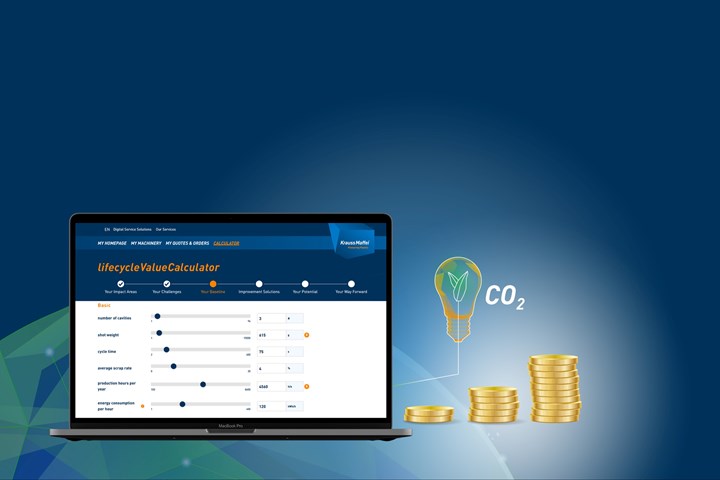KraussMaffei introduces calculation tool to predict product lifecycle costs
The lifecycleValueCalculator is an example of how digitalization is supporting decarbonization for injection molding, extrusion and reaction process technologies by creating transparency about CO2 emissions.
A new calculation tool KraussMaffei (Parsdorf, Germany) seeks to support plastics processors to determine the economic and ecological impact of a machine, a digital product or a lifecycle service over its product lifecycle, helping them meet their CO2 targets.
According to the company, a product’s total lifecycle costs are like an iceberg: only the tip is visible above the surface, while the vast majority of its mass lies underwater. For example, 80-90% of an injection molding machine’s lifecycle costs occur in the operation phase, but are mostly not quantified in detail. The situation is similar with CO2 emissions; here, 60-70% of emissions occur during the operation phase. “This means that the greatest potential for economic and ecological optimization is not immediately apparent,” explains Markus Lunz, head of service product and portfolio development, KraussMaffei.
The lifecycleValueCalculator by KraussMaffei makes this potential visible. With the calculation of individual ecological impacts from production, the tool also aids in the fulfillment of increasingly strict legal regulations and documentation requirements regarding ecological aspects.
The tool guides its users through the calculation in six simple steps, taking individual production parameters into account. The calculation starts with a concrete challenge (e.g., fluctuations in material quality or changing environmental conditions leading to increased scrap rates). The calculation then provides information regarding individual economic and ecological as-is-situation, such as regarding CO2 emissions, energy consumption, scrap-related costs or lost revenue due to downtime. Afterward, the tool quantifies the specific improvement potential by using KraussMaffei solutions which meet the customers’ challenges. In this way, the individual economic and ecological value of a KraussMaffei solution can be determined.
Digital service products like the lifecycleValueCalculator provide predictions so as to proactively react even before problems occur. In this way it is possible to determine and optimize CO2 emissions (decarbonization) while reducing costs for things like energy. “This is the heart of our D2-strategy,” Volker Ganz, vice president of customer excellence and global service operations, explains. “We strongly believe that economic business goals can only be achieved by reaching ecological goals at the same time. In this way, digital service products directly help our customers in meeting ecological targets.”
The lifecycleValueCalculator is the latest module in the pioneersClub, KraussMaffei’s customer portal. As a web-based solution, only a registration under pioneersclub.kraussmaffei.com is necessary. Currently, the calculator is already available free of charge in most European countries and North America and covers injection molding, extrusion and reaction process technology. More countries will follow soon.
For related content, visit CW’s lifecycle analysis page.
Related Content
-
ACMA sustainability event educates on composites LCA, recycling
Recent conference in Denver, Colorado, emphasized the tools and knowledge composites manufacturers will need to meet customer and government sustainability goals.
-
Measuring energy use to enable sustainable composites production
Airbus subsidiary CTC uses new technology to measure energy use in machine components and processes to optimize equipment, production lines and guide decisions for future composites.
-
Evonik publishes life cycle assessment data in online database
Evonik has made LCA information available for its High Performance Polymers Plastics database, which incorporates its fiber-reinforced and transparent polyamide products.

















